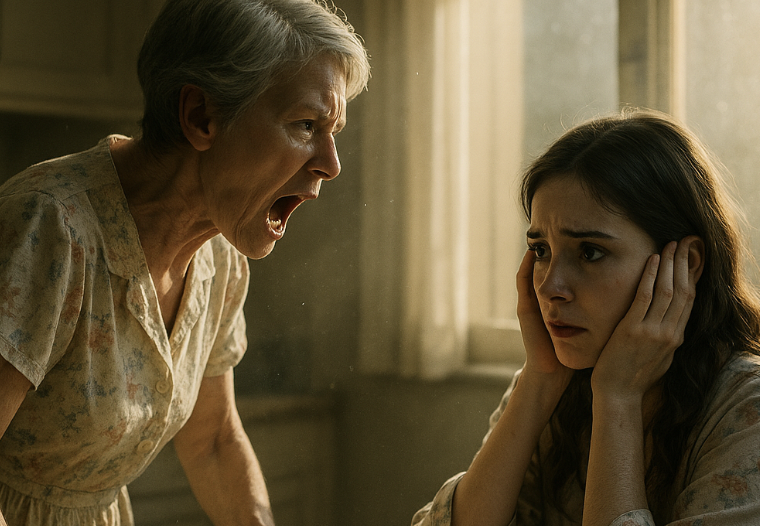Irina stood by the kitchen window, watching as October leaves swirled in the air before falling onto the wet asphalt. Ten-year-old Katya was fussing with her homework at the table, glancing at her mother now and then in the hope of getting help with math.
“Mom, how do I solve this problem?” the girl asked, pointing her pencil at the textbook.
Irina came over to her daughter and sat down beside her. Katya was a smart girl, but math didn’t come easily. From her first marriage, Irina had only warm memories of Katya’s father and the daughter herself—the most precious thing in her life.
“Let’s work through it together,” Irina smiled, taking the textbook.
An hour later her husband Sergei came home from work. He was an engineer at a factory and always returned tired, but he tried to give his family attention. He treated Katya with understanding and care, which Irina deeply appreciated.
“How’s it going, smart one?” Sergei asked, patting Katya on the head.
“I’m studying math, Papa Sergei,” the girl replied. She had immediately grown fond of her new dad, who never shouted and always listened.
The family idyll didn’t last long. Soon Galina Ivanovna—Sergei’s mother—burst into their lives. She had been widowed a year earlier and now spent most of her time visiting her son, scrutinizing the young family’s household with a critical eye.
The first signs of hostility appeared right away. Galina Ivanovna would enter the apartment without knocking, survey the rooms, and wrinkle her nose as if she saw something improper.
“Sergei, why does the girl have her own room?” the mother-in-law asked during one of her visits. “Isn’t that too luxurious for a child?”
Irina froze by the stove where she was cooking dinner. Katya was playing in her room and didn’t hear the conversation, but her mother could feel the atmosphere tightening.
“Mom, Katya is a member of our family,” Sergei replied calmly. “She needs a place to study and play.”
“A member of the family…” Galina Ivanovna drawled. “Well yes, of course.”
There was such coldness in the woman’s voice that Irina turned around and met her hostile gaze. Galina Ivanovna looked at her daughter-in-law as if she were an impostor.
The next visit brought new unpleasantness. Galina Ivanovna came on Sunday when the whole family was gathered at the table. Irina had tried to make something special—roast chicken with vegetables and a homemade salad.
“Katya dear, scoot closer to Mom,” Galina Ivanovna requested as she sat down. “I need a place closer to my little Sergei.”
The girl obediently moved, but Irina noticed her daughter frown. Katya was a sensitive child and picked up on adult moods.
“You cook well,” the mother-in-law said, tasting the chicken. “Although, of course, not the way Sergei likes it. He’s been used to different food since childhood.”
“How exactly?” Irina asked, trying to keep her composure.
“Home-style, real food. Not these modern experiments of yours.”
Sergei kept silent, eating intently and avoiding his wife’s eyes. Irina could see that her husband felt uncomfortable, but he preferred not to intervene between his mother and his wife.
After lunch, when Katya went to her room to do her homework, Galina Ivanovna launched a full-on attack.
“Sergei, I want to talk to you,” the mother-in-law announced. “About our family’s future.”
“Mom, we’re already a family,” her son answered wearily.
“What kind of family?” Galina Ivanovna snorted. “Strange blood isn’t kin. That girl will never be a real granddaughter. And you spend time and money on her—resources that should go to your own children.”
Irina stood at the sink washing dishes, her hands trembling with indignation. Blood rushed to her face, but she forced herself to stay silent so as not to create a scene in front of the child.
“Mom, don’t say that,” Sergei pleaded. “Katya is a good girl.”
“Good or not isn’t the point,” she waved him off. “It’s about blood, about lineage. And that girl is a stranger. She has her own room, your attention, and money is being spent on her needs.”
“Galina Ivanovna,” Irina couldn’t hold back any longer, turning from the sink. “Katya is my daughter, and as long as we live in this apartment, she will have her own room.”
The mother-in-law looked at her with undisguised contempt.
“As long as you live…” Galina Ivanovna said slowly. “And who said that will be for long?”
Sergei lifted his eyes from his plate and looked at his mother in surprise.
“Mom, what do you mean?”
“I mean that sooner or later a choice will have to be made,” she replied coldly. “Between the past and the future. Between other people’s children and your own blood.”
After Galina Ivanovna left, a heavy silence settled over the apartment. Katya sat in her room, but Irina was sure the girl had heard the conversation. Children always feel the tension between adults.
“Sergei, we need to talk,” Irina said when her husband settled in front of the TV.
“About what?” he asked without taking his eyes off the screen.
“About what’s happening. Your mother openly shows hostility toward Katya.”
“Mom is just getting used to the new situation,” he sighed. “She lost my father; it’s hard for her.”
“Sergei, she demands that Katya give up her room!”
“Mom didn’t demand anything like that.”
Irina sat down next to her husband and turned his face toward her.
“You heard the same thing I did. Galina Ivanovna considers my daughter a burden.”
“Don’t exaggerate. Mom is just voicing her opinion.”
“And what’s your opinion?”
Sergei stayed silent for a long time, and that silence told Irina more than any words. He was torn between his wife and his mother, but he didn’t want to choose.
The following weeks brought new trials. Galina Ivanovna began to come more often, as if checking how the family lived without her supervision. She criticized everything: from the meals Irina cooked to how she raised her daughter.
“You spend too much time with the girl,” the mother-in-law declared one evening. “Sergei comes home from work tired, and you’re busy with a stranger’s child instead of taking care of your husband.”
“Katya is not a stranger’s child,” Irina said through clenched fists. “She is my daughter.”
“To me she’s a stranger,” the mother-in-law cut her off. “And to our family line as well. And Sergei needs to think about his own children instead of wasting energy raising someone else’s girl.”
At that moment Katya was doing her homework in her room, but the thin walls couldn’t hide the loud voices. The girl was smart and understood that she had become the cause of family conflict.
“Mom, does Grandma Galya not love me?” Katya asked at bedtime.
Irina sat on the edge of her daughter’s bed and stroked her hair. How could she explain something she herself couldn’t understand?
“Adults sometimes behave strangely, honey,” she said softly. “That doesn’t mean there’s anything wrong with you.”
“But she says I’m a stranger.”
“You’re my own daughter, and no one has the right to say otherwise.”
Katya hugged her mother and pressed close. Irina felt how the tension of recent weeks was affecting the child. The girl had become withdrawn, played less, and spent more time in her room.
The breaking point came on one November evening. Galina Ivanovna arrived earlier than usual, when Sergei still hadn’t returned from work. She walked through the apartment, peering into every room as if inspecting the premises.
“Where’s Katya?” she asked.
“At school,” Irina answered. “They have extra classes.”
“Good. Then we can speak frankly.”
Galina Ivanovna sat in an armchair opposite the couch where Irina had settled and looked at her daughter-in-law with an appraising gaze.
“You’re a smart woman,” the mother-in-law began. “And you should understand that things can’t go on like this.”
“What are you talking about?”
“I’m talking about that girl destroying my son’s future. Sergei spends time, money, and emotions on her. And what in return? A stranger’s child will never be grateful. She’ll grow up and go back to her real father.”
Irina listened in silence, feeling indignation rising inside. Galina Ivanovna spoke of Katya as if she were an object, not a living person.
“Katya has no other father,” Irina said coldly. “Sergei is her real dad.”
“A real father should be blood,” the mother-in-law snapped. “And Sergei needs to think about his own children. But as long as a stranger’s child is in the house, he won’t be able to focus on what’s important.”
“And what are you proposing?”
Galina Ivanovna stood and walked to the window, where it was already dark outside.
“I’ve thought about this a lot,” she said slowly. “And I’ve concluded that the girl would be better off in a special institution. There she’ll learn discipline and be properly brought up.”
“What?” Irina shot up from the couch.
“An orphanage isn’t as frightening as it seems. Professionals work there; there’s routine, education. And Sergei will finally be able to build a normal family.”
“You’re proposing to send my daughter to an orphanage?”
“I’m proposing to think about the future. Yours, Sergei’s, your own children who could be born if not for this burden.”
Irina froze, staring at her mother-in-law. The woman spoke calmly and deliberately, as if discussing the purchase of new furniture.
“Galina Ivanovna, you’re not in your right mind,” Irina said quietly.
“I’m perfectly sane,” the mother-in-law replied. “And I’m saying what Sergei should have said. But my son is too soft to make tough decisions.”
Just then a key turned in the lock and footsteps sounded in the hall. Sergei had come home from work.
“Hello, my dears,” he called, taking off his jacket.
Galina Ivanovna straightened and gave her daughter-in-law a warning look.
“Think about what I’ve said,” she whispered. “And remember: I always get my way.”
Sergei walked into the room and saw the two women standing opposite each other in tense silence.
“What’s going on?” he asked, looking from his mother to his wife.
“We were just chatting,” Galina Ivanovna smiled. “About family matters.”
“Yes,” Irina nodded, trying to stay calm. “About family matters.”
But deep down she understood: a war had begun. And the stake in that war was her daughter’s fate.
That evening, when Katya came home from school, Galina Ivanovna was especially syrupy-sweet with Sergei, her “grandson.” She ostentatiously took an interest in his work, asked about his plans, and ignored Katya.
“Sergei, I think you need more space to relax,” his mother said, surveying the apartment. “This room could make an excellent study.”
She nodded toward Katya’s room.
“Mom, that’s Katya’s room,” her son reminded her.
“A child needs only a corner in your bedroom,” she waved it off. “A man needs a place to work and think.”
Irina pressed her lips together and kept washing the dishes, trying not to listen. But every word from her mother-in-law cut into her memory like a knife.
Late that evening, after Katya went to bed and Galina Ivanovna had gone home, the spouses had a serious talk.
“Your mother has gone way too far,” Irina said, closing the bedroom door.
“About what?”
“Sergei, she suggested sending Katya to an orphanage.”
Her husband spun around.
“What? When?”
“Today, while you were out. Galina Ivanovna considers my daughter a burden and wants to free our home of her.”
Sergei was silent for a long time, mulling it over.
“Maybe you misunderstood?”
“I understood perfectly. Your mother called Katya a burden and suggested getting rid of her for the sake of our future.”
“Mom sometimes says too much when she’s angry,” Sergei said. “You shouldn’t take everything she says to heart.”
“Too much?” Irina looked at her husband in amazement. “Sergei, your mother is demanding we get rid of my child!”
“She’s just worried about our future…”
“Our future can’t be built on rejecting Katya.”
“I’m not talking about rejection,” he objected hastily. “It’s just that Mom thinks the girl needs more discipline, more structure…”
“In an orphanage?”
Sergei fell silent, avoiding his wife’s gaze. The silence stretched for several minutes.
“You agree with your mother,” Irina said slowly.
“I don’t agree… I just think we should consider different options.”
“What options?” Irina’s voice turned dangerously quiet.
“Maybe a boarding school… a residential school… places where children are well brought up…”
Irina stood rooted to the spot, blinking, not immediately believing what she’d heard. He really was considering sending Katya away.
“You want to get rid of my daughter,” she stated.
“Irina, don’t dramatize. This isn’t about getting rid of her—it’s about what’s best for everyone.”
“For everyone? Or for your mother?”
“For our family. Mom is right that we need to think about our own children…”
“We already have a child. Katya.”
“We could have a child of our own. Ours by blood.”
Those last words sounded like a verdict. Irina understood: her husband truly saw Katya as a burden; he had just been afraid to say it.
She left the kitchen without a word and went to the bedroom. Sergei remained at the table, realizing he’d said something irreparable.
Irina opened the wardrobe and took out a large suitcase. Then she began carefully folding her husband’s clothes into it: shirts, trousers, underwear.
“What are you doing?” Sergei asked, appearing in the doorway.
“Helping you pack.”
“Pack for where?”
“To your mother’s. Since the two of you think my daughter has no place in this home, you can go live with your family.”
Sergei came closer and tried to take his wife’s hand.
“Irina, we can discuss everything calmly…”
“There’s nothing to discuss,” she pulled away. “You made your choice.”
“I didn’t choose anything! I only voiced an opinion…”
“An opinion that my daughter should live separately from us.”
He tried to protest, but his voice sounded uncertain.
“I didn’t say she should… I only suggested we could consider…”
“Consider sending a ten-year-old to a boarding school,” Irina finished for him. “Just to make your mother happy.”
Sergei said nothing, watching as his wife methodically packed his things. Suits, sportswear, shoes—all went into the suitcase.
“Irina, stop. Let’s talk like normal people.”
“Normal?” She straightened and looked at him. “Normal would have been defending my daughter from your mother’s attacks. Normal would have been telling Galina Ivanovna that Katya is a member of our family.”
“Mom just wants what’s best for us…”
“Your mom wants to get rid of Katya. And you support her.”
The suitcase was almost full. Irina snapped the locks shut and set it by the door.
“My daughter stays. You two are the ones leaving,” she said firmly.
“Irina, this is our home…”
“No. This is my home.”
She went to the dresser and took out a folder of documents. Sergei watched in surprise as she pulled out several sheets.
“Certificate of ownership,” Irina said, showing the document. “The apartment is in my name. I bought it before our marriage with money from the sale of my previous apartment.”
Sergei took the document and studied it carefully. Indeed, Irina was listed as the sole owner.
“I thought the apartment was jointly ours…”
“You thought wrong. And it’s a good thing we didn’t register it as joint property.”
He realized the seriousness of the situation. Legally, he had no rights to the home.
“Irina, don’t kick me out. I’m ready to talk to Mom, to explain to her…”
“Explain what? That Katya has the right to live in her own home?”
“Yes, exactly that.”
“Too late, Sergei. You’ve already shown where your priorities lie.”
Just then the doorbell rang. Irina looked through the peephole and saw the familiar silhouette of Galina Ivanovna.
“Your mother’s here,” she told her husband.
Sergei opened the door. Galina Ivanovna entered with the air of an owner but quickly noticed the suitcase in the hall.
“What’s going on?” she asked.
“Packing,” Irina said curtly.
“Who’s packing?” the mother-in-law didn’t understand.
“You and your son. You’re vacating my apartment.”
She looked at Sergei in bewilderment.
“Sergei, explain what’s happening.”
“Mom, we have a conflict with Irina…”
“There’s no conflict,” his wife cut in. “There’s a simple solution: Katya stays in her home, and you find somewhere else to live.”
Galina Ivanovna frowned and drew herself up to her full height.
“Young woman, you forget who you’re talking to.”
“To someone who wants to send my daughter to an orphanage.”
“I suggested a reasonable solution to family problems!”
“You suggested getting rid of a child for your own comfort.”
The mother-in-law shouted that her son had nowhere to go, that it was unfair, that Irina was destroying the family.
“Galina Ivanovna, you destroyed the family,” Irina replied calmly. “When you called my daughter a burden.”
“That’s what she is! A stranger’s child in the house is always a problem!”
“Then go solve your problems somewhere else.”
Irina took the apartment keys lying on the shelf in the hallway.
“I’ll be keeping these. I’m going to need them.”
“Irina, we can still smooth things over,” her husband tried to persuade her.
“Nothing can be smoothed over. You chose your mother over my daughter.”
Reluctantly, Sergei handed over his keys. Galina Ivanovna still couldn’t believe what was happening.
“You have no right to throw us out!”
“I do. It’s my apartment, and I decide who lives here.”
The suitcase ended up outside the door. Mother and son stood on the landing, not knowing what to do next.
“This is lawlessness!” the mother-in-law shouted. “I’ll go to court!”
“Go ahead,” Irina replied coolly. “But first study what rights guests have in someone else’s home.”
“Sergei is my son! And that girl is a stranger!”
“Katya lives in her own home. You do not.”
Her husband and mother-in-law left amid shouts and recriminations, but Irina was ready for the conflict to continue. She took out her phone and dialed the police.
“I want to report threats from my husband’s relatives.”
A patrol arrived half an hour later. Irina described in detail the mother-in-law’s demands, the pressure on the child, and the attempts to force her to give her daughter to an orphanage.
“We’ll draw up a report,” the senior lieutenant said. “In case the situation repeats.”
All this time Katya sat in her room, hearing the voices in the hallway. She was afraid to come out, not knowing what was happening.
“Mom, where’s Papa Sergei?” Katya asked when the police had left.
“Papa Sergei doesn’t live with us anymore,” Irina said, hugging her daughter.
“Because of me?”
“Not because of you, honey. Because the adults couldn’t agree.”
“Will he come back?”
“I don’t know. But you’ll stay with me, no matter what.”
The next day Irina filed for divorce. She decided there would be no more humiliation—neither for her nor for her daughter.
In the petition she stated the reason: irreconcilable differences on the upbringing of children and family values. She asked to dissolve the marriage without division of property, as there was no jointly acquired property.
Sergei tried calling several times, but Irina didn’t answer. He wanted to arrange a meeting and explain his position, but she was unyielding.
A week later a court summons arrived. Sergei had filed an objection to the divorce, citing temporary disagreements and the possibility of reconciliation.
At the hearing, Irina set out her position clearly: her husband and his mother had demanded that her daughter be sent to an orphanage or boarding school, considering the girl a burden to the family. Such a stance was incompatible with continuing the marriage.
The judge established the circumstances and decided to grant the divorce. The marriage was dissolved a month after the filing.
Galina Ivanovna tried to confront Irina near the house, but Irina walked past without reacting to reproaches and threats. The mother-in-law shouted that Irina had ruined her son’s life, but no one listened.
Gradually, Katya recovered from the stress she had endured. The girl began to smile again, to play, to invite classmates over. The room remained her room, the home—her home.
“Mom, are we not going to let anyone else in anymore?” Katya asked one evening.
“We will, honey,” Irina smiled. “But only those who respect us.”
“And who respect me too?”
“You too. Absolutely.”
Irina hugged her daughter and knew she had made the right choice. It was better to be alone with her child than to endure humiliation for the sake of preserving a marriage. Katya was her daughter, her family, her future. And no one had the right to demand a mother give up her own child.
That evening, after Katya went to bed, Irina sat in the kitchen with a cup of tea and thought about all that had happened. The decision had not come easily, but there was no doubt. Her daughter was more important than a husband who couldn’t protect the child from his own mother’s attacks.
Through the window, she could see yellow leaves torn from the trees by the wind. Autumn was ending; winter was approaching. But the home was warm and calm. Katya slept in her room, in her bed, under her blanket. And no one dared call the girl a stranger or unnecessary anymore.
Irina finished her tea, turned off the light, and went to bed. Tomorrow a new day would begin, a new life. A life without compromises when it came to a mother’s love.



